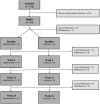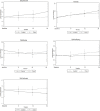Group singing in bereavement: effects on mental health, self-efficacy, self-esteem and well-being
- PMID: 31243022
- PMCID: PMC9510390
- DOI: 10.1136/bmjspcare-2018-001642
Group singing in bereavement: effects on mental health, self-efficacy, self-esteem and well-being
Abstract
Objectives: Bereavement is associated with negative affective, cognitive, behavioural and physiological responses. However, factors, such as coping, self-efficacy and self-esteem, can buffer negative effects of grief, and can be increased through mutual support interventions, such as shared leisure activities. This study used a non-randomised controlled design to explore the effects of group choir singing on mental health among people who have been bereaved due to cancer.
Methods: A total of 58 adults bereaved in the last 5 years who had not started psychological therapy in the last 12 weeks or medication for anxiety or depression in the last month were recruited and elected to join a choir (n=29) or participate in the non-intervention control group (n=29). Joining a choir involved engaging in 90 min weekly singing and social sessions for 12 weeks with a post-intervention assessment at week 24. We used linear mixed effects models adjusted for demographics, health-related variables, musical engagement and time since bereavement to model changes over time between the two groups in symptoms of anxiety, depression, well-being, self-efficacy and self-esteem.
Results: Participants who sang in a choir had more stable symptoms of depression and levels of well-being, as well as gradual improvements in their sense of self-efficacy and self-esteem over the 24 weeks. In contrast, those in the control group showed gradual increases in depressive symptoms, reductions in levels of well-being and self-esteem and no improvement in their self-efficacy. These results were independent of all covariates.
Conclusions: Weekly group singing could be a promising mutual support intervention for people experiencing grief.
Trial registration number: NCT02756780.
Keywords: bereavement; depression; psychological care.
© Author(s) (or their employer(s)) 2022. Re-use permitted under CC BY. Published by BMJ.
Conflict of interest statement
Competing interests: The funding for this study was provided by the Tenovus Cancer Care, the charity that runs the choirs used as the intervention in this study. However, no member of the staff from Tenovus Cancer Care was involved in the specifics of the study design or in the collection, analysis or interpretation of data, the writing of the report or the decision to submit the paper for publication.
Figures
References
Publication types
MeSH terms
Associated data
Grants and funding
LinkOut - more resources
Full Text Sources
Medical


